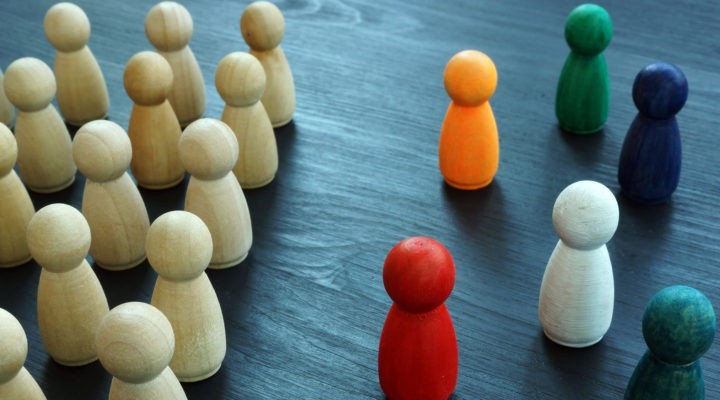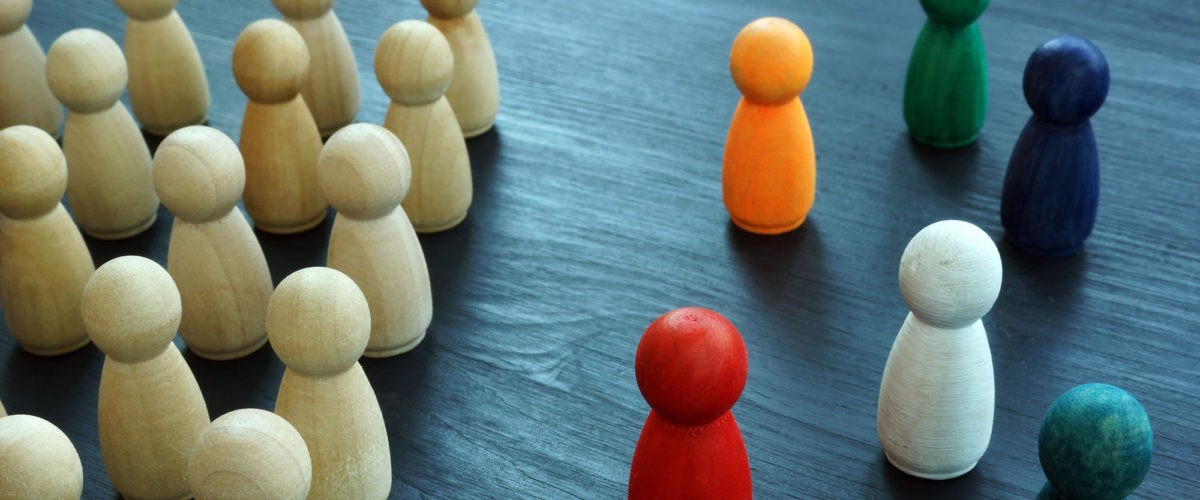The First Amendment and concepts such as separation of church and state and freedom of religion seem to signal that religious diversity is strong in the United States.
“Well, that’s not really true,” Khyati Joshi, author of White Christian Privilege: The Illusion of Religious Equality in America, said during the May 20 installment of “Voices of Asian American Faith Freedom,” a Facebook series hosted by Baptist Joint Committee for Religious Liberty.
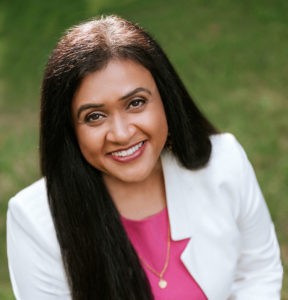
Khyati Joshi
Responding to questions from BJC Director of Education Charles Watson Jr., Joshi’s comments touched on the ways white Christian privilege generates overly optimistic assumptions about religious freedom, sets the conditions for religious discrimination and ultimately feeds into the rising tide of Christian nationalism.
“Christian nationalism rests on the foundation of Christian normativity,” which she described as “the way we go about our lives and the way that aspects of Christianity just become part of American life — especially white American life — where sometimes it may be difficult to separate what’s Christian and what’s American.”
Joshi, professor of education at Fairleigh Dickinson University in Teaneck, N.J., said she’s experienced the negative side of white Christian privilege growing up in a Hindu family that settled in Atlanta after immigrating to the U.S. in 1971.
“I wasn’t Black and I wasn’t quite white, so that led to a lot of confusion.”
“It meant I was harassed and bullied. I had a lot of not-so-nice experiences,” she said, qualifying that it was the color of her skin as much as her faith that drew the unwanted attention. “You know, when you’re 11 and 12, they’re not separating out racial ethnic identity from religious identity. I wasn’t Black and I wasn’t quite white, so that led to a lot of confusion.”
And there are the challenges religious minorities routinely encounter in the U.S., like difficulty in getting time off for non-Christian holidays and fielding inappropriate or awkward comments and questions about their faith filtered through Christian concepts and language.
Joshi said she couldn’t count “the number of times I have been asked, ‘What’s your Bible?’”
To which she would respond: “Do you mean, what are my sacred Scripture or Scriptures? Or if I have one?”
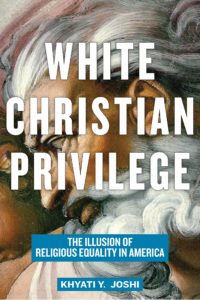 White Christian Privilege was written to help people see when those benefits are operative, she said. “When I’m talking about Christian privilege, it’s not necessarily about right and wrong but it’s about seeing what is there, and for many it’s been invisible.”
White Christian Privilege was written to help people see when those benefits are operative, she said. “When I’m talking about Christian privilege, it’s not necessarily about right and wrong but it’s about seeing what is there, and for many it’s been invisible.”
One place to start is with Christmas and other Christian holidays, she advised. “Can you notice that you were able to celebrate your holiday in full without worrying about a test, without worrying about a project deadline? This is something that religious minorities in this country have to do.”
But understanding Christian privilege becomes more nuanced when race is brought into the equation, she added.
“Sometimes I’m talking Christian privilege, and sometimes I’m talking white Christian privilege, because Black Americans who are Christian have Christian privilege and Asian Americans who are Christian have Christian privilege. But then there is race. Race is such a force in our country that Black Christians and Asian Christians don’t have the same kind of privilege as white Christians.”
Privilege also is a source of oppression, discrimination and marginalization, Joshi said. But that connection is masked by the belief that Constitutional protections shield the members of all faiths the way they do Christians.
“People may get that sense because they see mosques and Hindu temples and Greek Orthodox churches and big Catholic churches, meaning everybody can pray how they want and worship as they want,” she said. “But that’s not really the case, otherwise synagogues would not be getting attacked and masjids wouldn’t be attacked.”
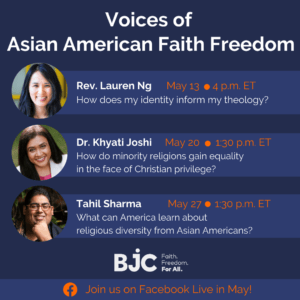 Even when oppression is noticeable, it’s seen as a rare exception, she said. “We talk about anti-Semitism but there are more than just Jewish Americans who face discrimination. Think about all the Native American spiritualities, Buddhism, Jainism, Islam. Religious oppression is a system of advantages and disadvantages based on religion.”
Even when oppression is noticeable, it’s seen as a rare exception, she said. “We talk about anti-Semitism but there are more than just Jewish Americans who face discrimination. Think about all the Native American spiritualities, Buddhism, Jainism, Islam. Religious oppression is a system of advantages and disadvantages based on religion.”
Asked to give her take on “faith freedom,” the theme of BJC’s virtual talks, Joshi said it is about responsibility to others. “For me, faith freedom is not only being able to practice my faith freely but making sure that others can do what they need to do to be their 100% authentic selves.”
BJC will host Tahil Sharma in “What Can American Learn About Religious Diversity from Asian Americans” at 1:30 p.m. May 27 on Facebook.

